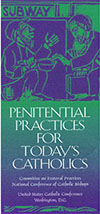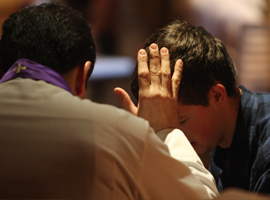Penitential Practices for Today's Catholics

Penitential Practices for Today's Catholics was originally published as a resource for the Jubilee Year 2000. You can order copies in brochure format (mutliples of 25 only) here.
This resource is presented as a pastoral tool for cultivating the penitential practices in one's daily life. While its focus is limited to a discussion of the Church's penitential practices, it serves to promote these practices as intimately related to the sacrament of penance. We exhort all of the faithful to accept the Lord's invitation to experience God's mercy through the sacrament of penance, which stands at the heart of the Church's penitential life.
During the Jubilee Year, we, the Church, focused our attention on the person of Jesus Christ, our Lord and Savior. Our Holy Father, Pope John Paul II, urged all the people of God to grow in conformity to Christ, who leads us to the Father through the gift of the Holy Spirit. One important way to grow in the Lord is to observe the penitential practices that strengthen us for resisting temptation, allow us to express our sorrow for the sins we have committed, and help to repair the tear caused by our sinning.*
Penitential practices take many forms: apologizing to an injured party, healing divisions within our families, fasting during the Lenten season, or graciously accepting the menial tasks of life. The purpose of penance is not to diminish life but to enrich it.
Jesus, in Matthew's Gospel, calls us to pray, to fast, and to give alms: "when you pray, do not be like the hypocrites," "when you fast, do not look gloomy," "when you give alms, do not let your left hand know what your right is doing" (Mt 6:5, 16, 3, respectively). As a Church, we ponder and pray over this call every Ash Wednesday. In a most profound way, the three spiritual exercises identified by Jesus are directed toward the nurturing of relationships.Prayer, that process of listening to and responding to God's daily call, sustains and nurtures our relationship with our triune God: Father, Son, and Holy Spirit. Without prayer, personal and communal, this relationship is diminished, sometimes to the point of complete silence on our part. Every day the Spirit of Jesus
invites us to enter into that serious conversion that leads to blessed communion.
 Fasting, a very special form of penance, and Jesus' second call, has been a consistent part of our Catholic tradition. Fasting assists us in getting our own house in order. All of us have to deal with areas of servitude, whether in regard to smoking or alcohol consumption, misused sexuality, uncontrolled gambling, psychological hang-ups, spiritual obsessions, use of stimulants, immoderate use of the Internet, excessive amounts of television watching, or preoccupations with other forms of entertainment. By fasting and self-denial, by living lives of moderation, we have more energy to devote to God's purposes and a better self-esteem that helps us to be more concerned with the well-being of others.
Fasting, a very special form of penance, and Jesus' second call, has been a consistent part of our Catholic tradition. Fasting assists us in getting our own house in order. All of us have to deal with areas of servitude, whether in regard to smoking or alcohol consumption, misused sexuality, uncontrolled gambling, psychological hang-ups, spiritual obsessions, use of stimulants, immoderate use of the Internet, excessive amounts of television watching, or preoccupations with other forms of entertainment. By fasting and self-denial, by living lives of moderation, we have more energy to devote to God's purposes and a better self-esteem that helps us to be more concerned with the well-being of others.
Voluntary fasting from food creates in us a greater openness to God's Spirit and deepens our compassion for those who are forced to go without food. The discomfort brought about by fasting unites us to the sufferings of Christ. Fasting should bring to mind the sufferings of all those for whom Christ suffered. One may refrain from certain foods strictly for dietary purposes, but this would not be Christian penance. Rather, our fasting and refraining is in response to the
workings of the Holy Spirit. By fasting we sense a deeper hunger and thirst for God. In a paradoxical way, we feast through fasting—we feast on the spiritual values that lead to works of charity and service. Did not the prophet Isaiah proclaim that such works characterize the fasting that God desires?
This . . . is the fasting that I wish:
releasing those bound unjustly,
untying the thongs of the yoke;
Setting free the oppressed,
breaking every yoke;
Sharing your bread with the hungry,
sheltering the oppressed and the
homeless;
Clothing the naked when you see them,
and not turning your back on your
own. (Is 58:6-7)
Our weekly—and for some, daily—celebration of the Eucharist also affords us the opportunity to fast before receiving the Lord. This eucharistic fast disposes us to experience more deeply the coming of the Lord and expresses our seriousness and reverence for the Lord's coming into our lives. This practice, along with all the other penitential practices, is a means to an end: growth in our life in Christ. Whenever the means becomes the end, we are vulnerable to self-righteousness and spiritual arrogance.
The third call of the Lord is to give alms. Jesus was always concerned about those who were poor and in need. He was impressed by the widow who, though having so little, shared her resources with others: "I tell you truly, this poor widow put in more than all the rest; for those others have all made offerings from their surplus wealth, but she, from her poverty, has offered her whole livelihood" (Lk 21:3-4). To be a disciple of Christ means to live a life of charity. To be a disciple of Jesus is to live a life of stewardship, generously giving of our time, talent, and treasure.
 Our Lord's threefold call to pray, to fast, and to give alms is richly interconnected. In prayer the Holy Spirit, always active in our lives, shows us those areas where we are not free—areas that call for penance—as well as those people who are in need of our care. Through fasting, our spirit becomes more open to hearing God's call, and we receive new energies for performing works of charity. Almsgiving puts us in contact with the needy whom we then bring back to
Our Lord's threefold call to pray, to fast, and to give alms is richly interconnected. In prayer the Holy Spirit, always active in our lives, shows us those areas where we are not free—areas that call for penance—as well as those people who are in need of our care. Through fasting, our spirit becomes more open to hearing God's call, and we receive new energies for performing works of charity. Almsgiving puts us in contact with the needy whom we then bring back to
God in prayer.
At the heart of all penance is the call to conversion. Jesus' imperative "Repent, and believe in the gospel" (Mk 1:15) makes explicit this connection between authentic discipleship and penitential discipline. Discipleship, our following of Jesus, embraces discipline, a firm commitment to do whatever is demanded in furthering God's kingdom. Viewed in this way, the virtue of penance is not optional, just as weeding a garden is not optional for a responsible caretaker. The gardener is concerned with a bountiful harvest; the disciple is concerned about greater conformity to the person of Jesus.
If we are serious about embracing the penitential discipline that is rooted in the call to discipleship, then we will identify specific times and places for prayer, penance, and works of charity. Growth in spiritual maturity demands a certain level of specificity, for it shows that we take seriously God's call to discipline and are willing to hold ourselves accountable. In our Catholic tradition we specify certain days and seasons for special works of penance: Fridays, on which we commemorate the death of the Lord, and Lent, our forty days of preparation for the Easter mysteries.
Recalling our Lord's Passion and death on Good Friday, we hold all Fridays to have special significance. Jesus' self-denial and self-offering invite us to enter freely into his experience by forgoing food, bearing humiliations, and forgiving those who injure us. Through the grace of the Holy Spirit, the principal agent of all spiritual transformation, this can be done—and done with a spirit of quiet joy. For Christians, suffering and joy are not incompatible.
 The season of Lent has traditionally been a time of prolonged penance for the Christian community. Together we prepare for the great Easter mysteries by committing ourselves to fulfill our baptismal call to maturity, holiness, service, and community. Our response to each call will demand sacrifice, mortification, asceticism, and denial of our own self-will. Mortification helps to "put to death" the cancer cells of sin; asceticism brings a discipline that makes us increasingly free and responsible. Again, this action and grace of the Holy Spirit are what enlighten, enkindle, and empower us to live more fully the way of discipleship.
The season of Lent has traditionally been a time of prolonged penance for the Christian community. Together we prepare for the great Easter mysteries by committing ourselves to fulfill our baptismal call to maturity, holiness, service, and community. Our response to each call will demand sacrifice, mortification, asceticism, and denial of our own self-will. Mortification helps to "put to death" the cancer cells of sin; asceticism brings a discipline that makes us increasingly free and responsible. Again, this action and grace of the Holy Spirit are what enlighten, enkindle, and empower us to live more fully the way of discipleship.
Our American culture, which emphasizes having many possessions and an excessive self-preoccupation, has difficulty accepting the penitential practices of our Catholic tradition. Current philosophies would have us believe that we are here to be entertained and that we are born to be content. Jesus' message is one of service: "For the Son of Man did not come to be served but to serve and to give his life as a ransom for many" (Mk 10:45). In this modern context,
we fulfill our mission of evangelization by living the Gospel. Witnessing to gospel values helps to transform our culture. Our culture is in great need of justice and charity, virtues that cannot be achieved without grace and openness to conversion. There are always unconverted areas of minds and hearts; there are always factors in our social structures that need uprooting,repair, or restoration. All of us are called to participate in this evangelizing work of transforming
our world.
During the Jubilee Year, our Holy Father called us to conversion, reconciliation, and solidarity. To continue to live that call, we might take the spiritual and corporal works of mercy as a penitential model. These fourteen practices demand great sacrifice and generosity; they also draw usmore deeply into conformity with the Lord. Focusing on one of these works each week may be a practical way of integrating them into ourpersonal, family, and parish lives.
Corporal Works of Mercy
- Feeding the hungry
- Sheltering the homeless
- Clothing the naked
- Visiting the sick
- Visiting the imprisoned
- Giving drink to the thirsty
- Burying the dead
More about the Corporal Works of Mercy
Spiritual Works of Mercy
- Converting sinners

- Instructing the ignorant
- Advising the doubtful
- Comforting the sorrowful
- Bearing wrongs patiently
- Forgiving injuries
- Praying for the living and dead
More about the Spiritual Works of Mercy
Penitential practices express in visible signs and deeds the interior conversion of heart. Because we are called by Jesus to give our whole selves to the Father, conversion means a radical reorientation of our whole lives toward God's kingdom. We turn away from evil, resolve not to sin, and trust in God's amazing grace. There will be sadness for past wrongs but deep joy in the working of grace.
In the end, our life in Christ is about loving God with our whole heart, mind, and soul, and about sharing God's love with others. Penitential practices are essential if we are to turn away from sin, believe in the Gospel, and share God's love with one another.
SAMPLE EXPRESSIONS OF PENANCE
- Efforts at reconciliation with a family member or neighbor
- Tears of repentance
- Concern for the salvation of our sisters and brothers
- Prayer to the saints for their intercession
- Patient acceptance of the cross we must bear to be faithful to Christ
- Defense of justice and right
- Admission of faults to God and to one another n Mutual correction
- Offer and acceptance of forgiveness
- Endurance of persecution for the sake of God's kingdom
- Development of a spirit of penance
- Witness to a Christian way of life
